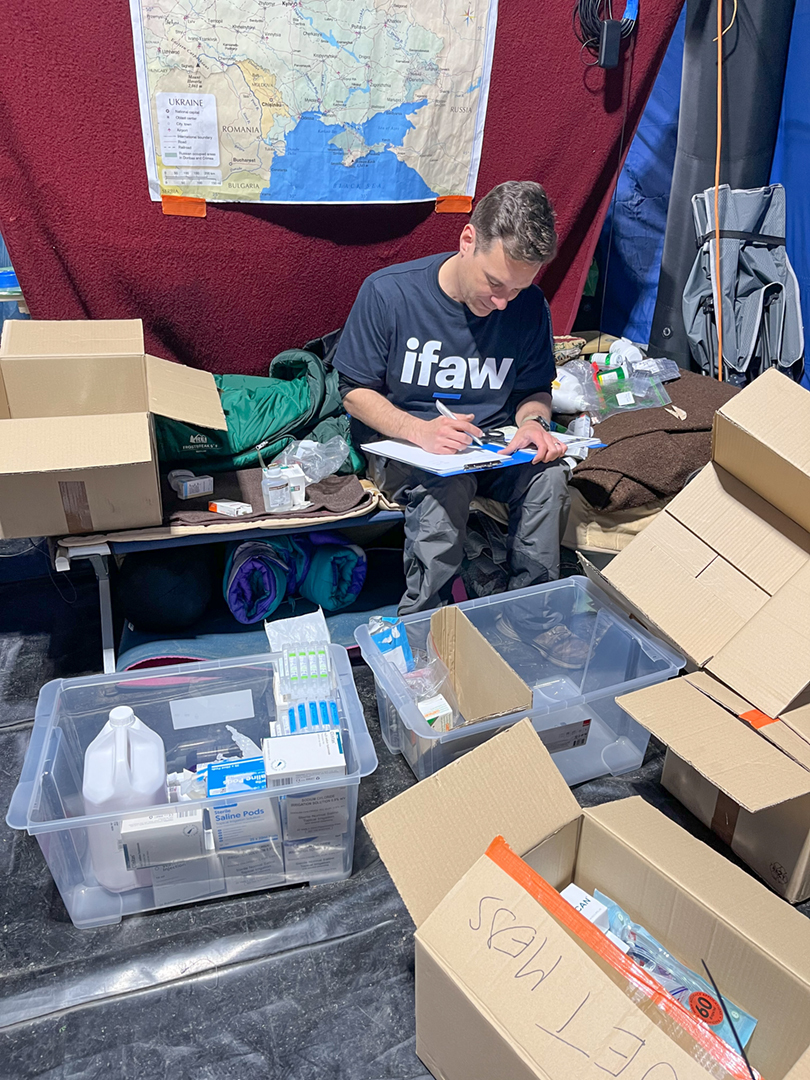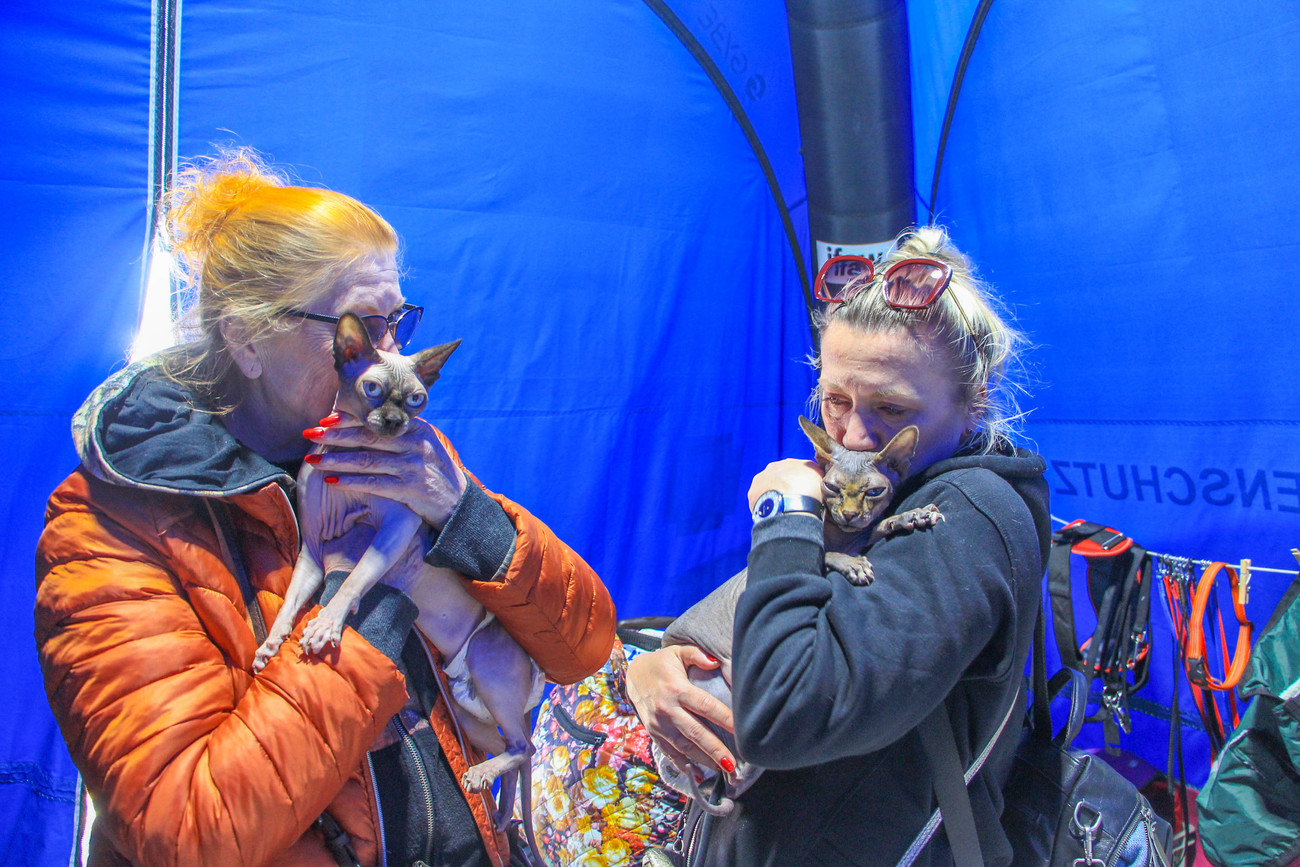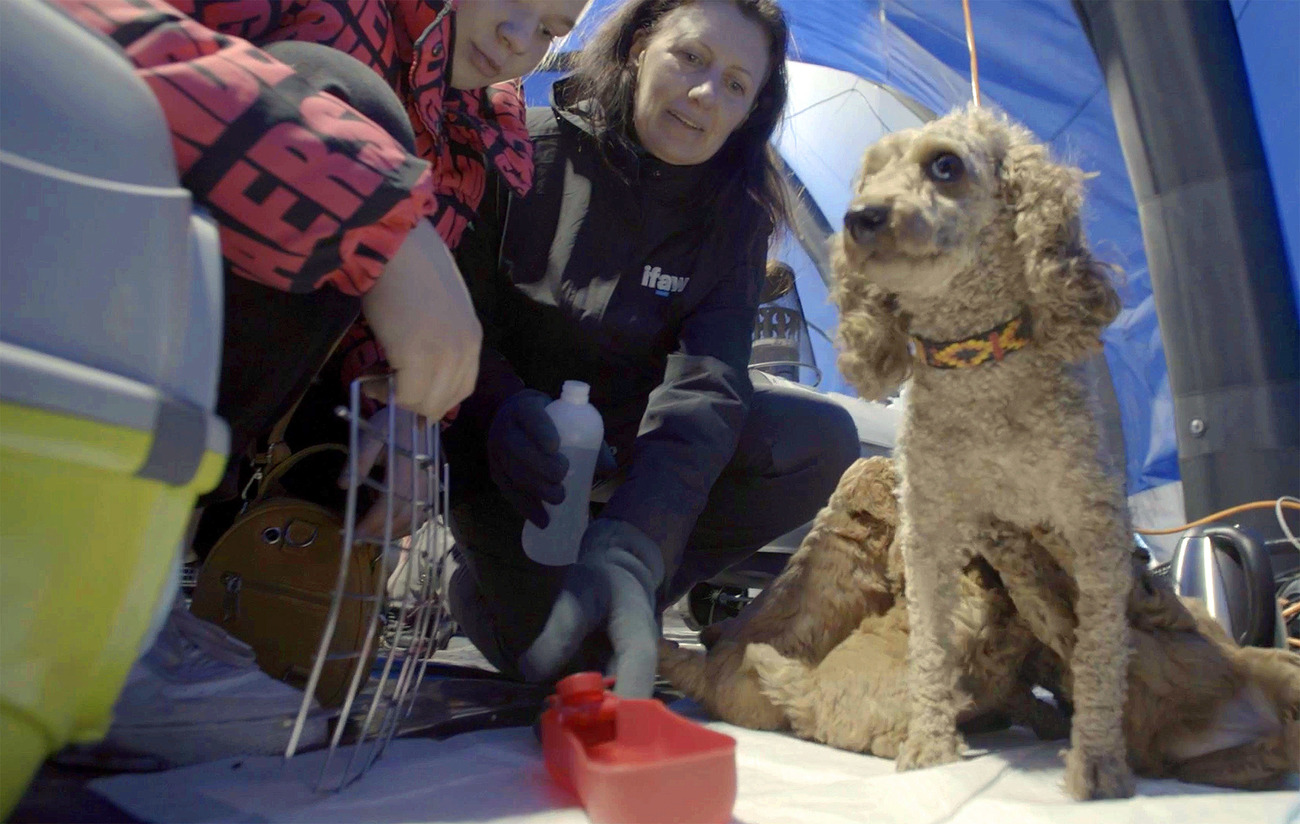Press releases
WhaleAlert: the app to help to protect whales
Read morestories of heartbreak and hope: my time at the Ukraine border

When the bombs came, Veronika, an elderly but resolute woman, searched frantically for her little Pushinka in the small apartment she called home. Meaning “fluff” in Ukrainian, two-year-old Pushinka had in the previous month, endured a lifetime of struggles. Despite Veronika’s best efforts, the gentle grey cat was nowhere to be found, and Veronika made the heartbreaking decision to leave without her dear feline companion.
Weeks passed and at Veronika’s persistent requests, a neighbor returned to the apartment in Kharkiv, and there sat Pushinka, distraught but alive. How she survived is unknown.
I met Pushinka and Veronika as they reunited at the Polish border town of Medyka. Deployed as a responder with IFAW, I helped manage the blue tent welcoming 6,000 refugees crossing on foot from Ukraine each day.
As a behind-the-scenes as well as front-line organisation creating better outcomes for animals, people and the places we call home, IFAW was amongst the first to take action when the conflict unfolded. I myself deployed with IFAW once before, during the 2019–2020 Australian bushfires, but something was different about this operation. It wasn’t so much about animals as it was about family.
Day and night, the clitter-clatter of luggage wheels banging against bumpy pavement announced waves of women, children and elderly looking for safe havens. From all backgrounds and stages of life, they took with them only the most precious essentials—namely, each other. What stood out for us was that included in these family units were their beloved pets. They simply refused to leave them behind.

Animals of all shapes, sizes, scaled, furred and feathered, came through the tent. Cats were remarkably affectionate, and dogs largely well socialised and happy to get attention from strangers donning blue tops and with funny accents.
Each animal, like its human companion, harboured a heartbreaking story. But I also witnessed tales of hope and great resilience, like the wearied dog I met as he limped across the border with a shrapnel wound acquired when his apartment was blasted to rubble. The owner was eventually found, but without a home, he could not take care of this sweet dog. Kind-hearted rescuers promised the elderly man they would bring the dog to safety and give him a good life. Finally arriving at the blue tent, underweight and exhausted, we gave the dog a meal, water and a new harness. I quietly wished him well as he continued on with his intrepid rescuers.
In front of the tent were IFAW interpreters, young people who themselves fled the conflict but opted to stay on to help their fellow Ukrainians. Their tireless efforts and upbeat energy kept the rest of the team going, and they were literally the link to those most in need. When a refugee would come through the gates with an animal, the interpreter would greet them and guide them to whatever was needed. Sometimes pets would be packed in small carriers two or three at a time. Others were hurriedly stuffed into boxes with holes punched in the sides where they would stay for days on end. Still others had been walking for days without a meal and were now in poor condition and dehydrated. Some had wounds and medical conditions. All were tired.
If the pet needed a rest, drink or meal, we made that happen. There was a veterinary clinic set up at the nearby train station where we directed families for further care if necessary. Before they left, we made sure they had the necessary water bowls, food, animal clothing, carriers, leads, harnesses, stress-relieving supplements and basic supplies.
At times the families just needed a break. They longed for a warm meal, shower and rest. We were able to give their pets time-outs so they could tend to basic needs. In fact, perhaps my greatest role was relieving families of one stressor so they could breathe. In the blue tent, they knew their beloved pets were in good hands. It may sound like a small thing, but it was one fewer small thing.
It was not uncommon to share brief but intimate moments with people fleeing for their lives, like an exhausted mother who broke down after we gave her dog a little red jacket. Putting her hands together to her mouth as if in prayer, she yelled out with tears in her eyes, “Bless you, you are all so amazing!” I couldn’t believe it. She travelled for days, reaching the border with children and animals all on her own. Her unrelenting spirit got all of them here. “I am so proud of you; look what you’ve done, looked what you’ve achieved!” was all I could muster. Tearful and exhausted but bolstered by the milestone, the woman turned and continued her journey. Each member of our team witnessed countless such stories as these, of great struggle, hope, comfort and gratitude, and we were better for it.

Pushinka finally reached the border to reunite with Veronika. After several days’ travel, she arrived at our tent, panic-stricken. We moved her to a large crate. Then I witnessed something incredible—our team leader Diane opened the cage door, leaned in and told Pushinka it was going to be okay. Pushinka immediately leaned heavily into Diane’s arms, pushed her head into Diane’s hands and closed her tired eyes. Finally at peace, Pushinka and her new friend held each other for the next 20 minutes as the chaos hushed into the peaceful silence of the moment shared.
Finally rested, Pushinka’s human companion Veronika said a blessing to us all as she shouldered her heavy luggage for the next long stage of her journey. She planned to join family somewhere safe, but most of all she hoped to return one day to her beloved country. I was concerned about their journey ahead but in the meantime, felt gratitude that in these dark times she and Pushinka would have each other.
As I write this piece I am on my way back to my own loved ones, unsure of how I will process my time at the gates. It has been so upsetting to see how we can treat each other, and yet there is something so humbling about bearing witness to the best of humanity in the worst of times. These people could have been me, our main difference being as simple as location of birth. When the soldiers came, what would I have done? What would you have done?
As I look out the window from 38,000 feet as the spring patchwork of yellow and green farmlands, speckled towns and grey cities roll by. I could be anywhere. A reminder that perhaps, after all, we share more in common than we realise.
—Dr. Paul Ramos, veterinarian
A version of this story originally appeared in Animal Culture Online Magazine
Every problem has a solution, every solution needs support.
The problems we face are urgent, complicated, and resistant to change. Real solutions demand creativity, hard work, and involvement from people like you.
Unfortunately, the browser you use is outdated and does not allow you to display the site correctly. Please install any of the modern browsers, for example:
Google Chrome Firefox Safari